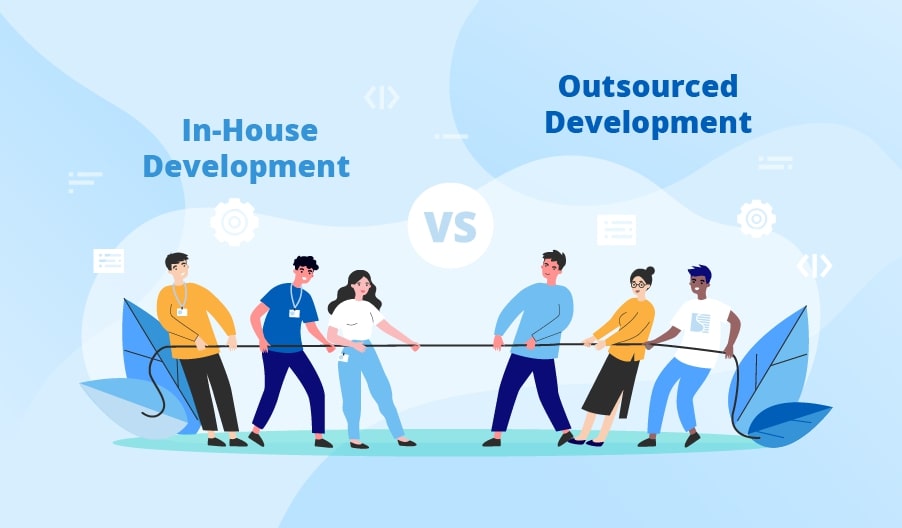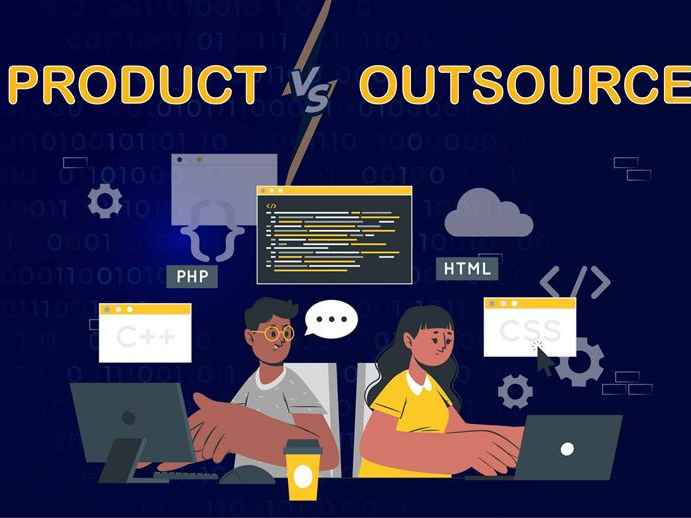What does Outsource mean?
It refers to the practice of hiring personnel who are not part of the company’s internal staff.
What Is an Outsourcing Company?
Once you understand what it means to do outsourcing work, the definition of an outsourcing company becomes much clearer.
An outsourcing company is a business that is hired by another organization or individual to develop software. Their ultimate goal is to satisfy their clients, not to create or own the products themselves. They also don’t need to promote or market products to generate revenue.
Outsourcing companies are typically paid per project or by the hour.
Similarly, agencies can also be considered a type of outsourcing company.
What Is a Product Company?
Definition of Working in Product
This concept is the complete opposite of outsourcing. Product refers to the in-house workforce of a company — employees who work day and night to create products owned by their own organization.
What Is a Product Company?
More specifically, a product company is one that directly develops, publishes, markets, and sells the digital products it creates. These products are usually designed to meet the needs of end users.
Therefore, the main source of income for a product company comes from the profits generated by selling its own products — meaning they only make revenue when users purchase what they’ve built.
Pros and Cons of Working at Product vs. Outsourcing Companies
Both outsourcing and product models have their own unique characteristics and advantages.

Should You Work in Outsourcing or Product?
Outsourcing Company
Advantages
-
You get the opportunity to work on projects across various industries, both locally and internationally.
-
Working in an outsourcing company exposes you to exciting challenges and helps you expand your professional network.
Disadvantages
-
You don’t have full control over the product’s quality or direction. Instead, you must follow the client’s requirements.
-
The level of difficulty can double when your clients are also IT professionals — their technical feedback might sometimes drive you a bit crazy.
-
As part of an outsourcing company, you’ll need to get used to working overtime (OT). Staying late in the office — even on Saturdays and Sundays — can become a routine.
-
Overworking reduces your rest time and can significantly affect both your health and personal life.
Product Company
Advantages
-
When you work at a company that develops its own software, you get to deepen your expertise in the IT field. You’ll have the opportunity to understand the full workflow and project management process more thoroughly.
-
Fresh graduates who join an in-house company are often trained step by step — from the basics to advanced levels.
-
You can take part in the entire production process and have full control over the quality of the product you build.
-
Since product companies usually develop a product over a long period, their teams tend to be more stable and tightly connected.
Disadvantages
-
You may struggle to keep up with long-term technological development if your technical foundation isn’t strong enough. Most programming work requires careful and detailed planning.
-
Product companies often rely heavily on product sales for revenue, which can make their financial resources relatively limited.
Outsourcing and Product Companies in Vietnam
Here is a list of some notable Product and Outsourcing companies you can consider:
Vietnamese Outsourcing Companies
-
FPT Software
-
TMA Solutions
-
NashTech
-
Hitachi Vantara Vietnam
-
Axon Active
-
Tek Experts
-
ELCA Vietnam
-
Rikkeisoft
-
Melisoft

Melisoft
Vietnamese Product Companies
-
Tiki
-
VNG
-
Grab Vietnam
-
Knorex
-
KPMG Digital Enablement
-
ZALORA Group
-
LG Development Center
-
Hybrid Technologies

Tiki is one of the most well-known Product companies in Vietnam.
Product vs. Outsource — Which Type of Company Should You Choose?
In truth, there’s no single right answer to “Should I work in Outsourcing or Product?”
With an outsourcing company, you’ll challenge yourself across a wide range of fields and build a broad network. You’ll meet people from many industries and gain exposure to a variety of real-world problems. If you want to work on many different projects, outsourcing is a solid choice.
On the other hand, product companies tend to offer greater stability and team cohesion. That stability and close-knit environment can motivate employees and give you more confidence in your work. If you want to play a meaningful role in the product development process and help bring product value directly to users, a product company may be a better fit.
Which one you choose depends on you. Take time to reflect and learn more about both product and outsourcing companies — then pick the option that best suits your goals and personality.

